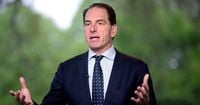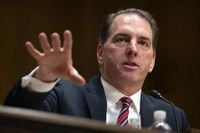WASHINGTON — In a swift and surprising turn of events, Gary Shapley has been ousted from his newly appointed role as acting commissioner of the Internal Revenue Service (IRS), just days after his promotion. This shake-up comes amid reported tensions between Treasury Secretary Scott Bessent and Elon Musk, who has been actively involved in the Trump administration's efforts to reshape government efficiency.
Shapley, who was appointed to the position on April 15, 2025, was replaced by Deputy Treasury Secretary Michael Faulkender on April 18, 2025. Sources close to the situation indicated that Bessent was furious over Shapley’s appointment, claiming he was not consulted about the decision. The New York Times first reported this development, highlighting the internal conflicts within the administration.
Shapley is known for his role as a whistleblower, having testified before Congress in 2023 regarding alleged preferential treatment given to Hunter Biden during a tax-evasion investigation. His claims included accusations that the Justice Department had deliberately stalled the investigation and that he and another special agent were removed from the case after raising concerns with their superiors.
As a conservative figure, Shapley garnered support from right-leaning factions who viewed him as a champion of accountability within the IRS. However, his brief tenure as acting commissioner has been marred by power struggles and shifting allegiances within the Trump administration.
According to White House press secretary Karoline Leavitt, President Trump has assembled a team of individuals who are deeply committed to addressing the nation’s pressing issues. However, the dynamics of this team appear fraught with conflict, particularly as Musk’s Department of Government Efficiency (DOGE) sought to influence key appointments.
In the wake of Shapley’s ousting, Musk took to social media platform X to express his concerns over Bessent's meetings with individuals he labeled as “Trump haters.” His comments followed a meeting that Laura Loomer, a right-wing activist, had with White House officials, which reportedly led to the dismissal of several National Security Council staffers due to perceived disloyalty.
Shapley’s replacement, Faulkender, is the fifth individual to lead the IRS since the beginning of 2025. His appointment comes amidst ongoing turmoil within the agency, which has experienced significant turnover and internal strife. Faulkender previously worked on the Paycheck Protection Program during the first Trump administration and has been confirmed as deputy secretary at the Treasury Department.
The IRS has faced immense scrutiny over its handling of taxpayer data and has been under pressure to downsize its workforce. Reports indicate that the agency is considering cuts that could reduce its staff by as much as 40%, potentially bringing the total number of employees down from approximately 102,000 to between 60,000 and 70,000.
Shapley’s tenure was notably short, lasting only three days, and he remains in a senior position within the IRS Criminal Investigation division. His removal has raised questions about the stability of leadership within the agency and the ongoing impact of political influences on its operations.
Former IRS commissioner Danny Werfel departed in January 2025, and since then, the agency has seen a revolving door of leadership. Douglas O’Donnell briefly took the helm before retiring abruptly, followed by Melanie Krause, who resigned over pressures related to sharing taxpayer data with immigration authorities. The instability raises concerns about the IRS's ability to effectively manage its responsibilities.
As the IRS navigates these challenges, the political landscape continues to evolve. The Senate has yet to schedule a confirmation hearing for Trump’s nominee to permanently lead the IRS, former Congressman Billy Long of Missouri, amid ongoing discussions regarding his qualifications and past initiatives.
Shapley’s claims of preferential treatment in the investigation of Hunter Biden have fueled partisan debates and intensified scrutiny of the Justice Department’s actions. His testimony alleged that Biden-appointed U.S. attorneys declined to pursue charges against Hunter Biden and that investigators were discouraged from exploring certain lines of inquiry related to the President.
As the situation unfolds, the IRS finds itself at a crossroads, grappling with leadership changes and the implications of political maneuvering. The agency’s future direction will likely depend on how well it can stabilize its leadership and regain public trust amid ongoing scrutiny.
Ultimately, the recent upheaval within the IRS underscores the challenges faced by federal agencies in maintaining continuity and effectiveness in an increasingly polarized political environment.








